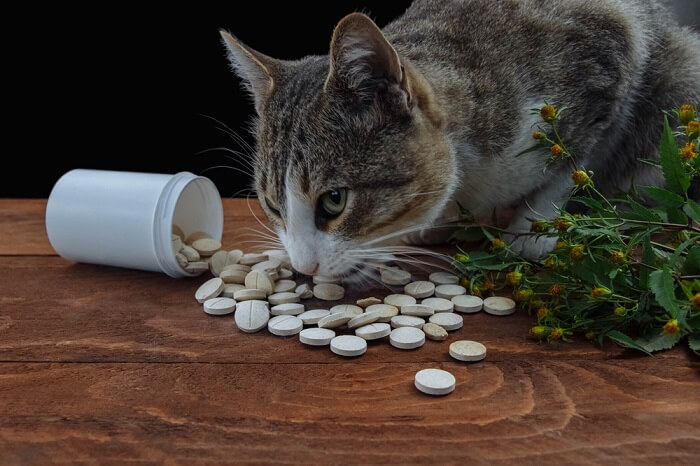Acetaminophen is toxic to cats and can cause severe health issues or even be fatal to them. Also known as tylenol, this commonly used over-the-counter medication should never be given to cats as their bodies cannot process it properly.
Cats lack a specific enzyme needed to metabolize acetaminophen, leading to the accumulation of toxic byproducts that can damage their red blood cells and liver. Ingestion of even a small amount can result in symptoms such as vomiting, difficulty breathing, swollen face or paws, and can progress to more severe conditions like liver failure or death.
It is crucial for cat owners to be aware of the dangers of acetaminophen and always keep it out of their feline friends’ reach.

Credit: cats.com
Understanding Acetaminophen Toxicity In Cats
Acetaminophen, commonly known as tylenol, is widely used by humans to relieve pain and reduce fever. However, when it comes to cats, this medication can be extremely toxic. Cats lack a specific enzyme that is essential for metabolizing acetaminophen, making it highly dangerous for them.
If you expose your cat to even small amounts of acetaminophen, it can cause severe damage to their red blood cells and lead to liver failure. Unlike humans, cats are unable to effectively process and eliminate acetaminophen from their bodies.
This stark difference in metabolism between humans and cats is what makes acetaminophen toxic to our feline friends. Therefore, it is crucial to keep all medications containing acetaminophen safely out of reach from cats and consult a veterinarian immediately if accidental exposure occurs.
Remember, a small dose of acetaminophen that may be harmless to us can be fatal to cats.
Recognizing The Symptoms Of Acetaminophen Toxicity In Cats
Acetaminophen toxicity in cats can have serious consequences for their health. Recognizing the symptoms is crucial in ensuring prompt treatment. Common signs of poisoning include vomiting, drooling, lethargy, and difficulty breathing. The ingestion of acetaminophen affects various body systems in cats, such as the liver, kidneys, and red blood cells.
Immediate veterinary intervention is of utmost importance to prevent further damage and provide appropriate care. Timely treatment can help minimize the potential long-term effects and improve the chances of a cat’s recovery. If you suspect your cat has ingested acetaminophen, don’t hesitate to seek professional help to ensure their well-being.
Keep medications securely stored and out of reach of curious felines to prevent accidental ingestion. Remember, your cat’s health is in your hands, so stay vigilant and prioritize their safety.
Treating And Preventing Acetaminophen Toxicity In Cats
Acetaminophen toxicity is a serious concern for cats. Immediate action is crucial to treat acute poisoning, which may involve inducing vomiting, administering activated charcoal, and providing supportive care. Long-term management focuses on monitoring the cat’s liver function and providing appropriate medications.
Recovery strategies include liver-protective supplements and a balanced diet. To prevent accidental exposure, it’s important to keep all acetaminophen-containing products out of reach of cats. Store medications securely and dispose of any unused or expired ones properly. Be cautious when using over-the-counter pain relievers and check with a veterinarian before administering any medication to your cat.
Educate yourself about the potential dangers of acetaminophen and take proactive steps to keep your feline friend safe from this toxic substance.
Other Medications And Substances That Are Toxic To Cats
Acetaminophen, commonly known as tylenol, is toxic to cats and should never be given to them. However, it’s not the only medication or substance that can be harmful to these furry friends. There’s a comprehensive list of other medications that can be toxic to cats, so it’s essential to be aware of them.
Moreover, it’s not just medications that can pose a danger. Common household substances such as cleaning products, certain plants, and even some foods can be toxic to cats. When it comes to their health, consulting a veterinarian is crucial. They can provide guidance on which medications are safe and how to keep your feline companion away from harmful substances.
Remember, a vet’s advice is valuable in safeguarding your cat’s well-being. Avoid taking any risks with their health and always seek professional guidance.
Promoting Cat Health And Safety
Acetaminophen can be toxic to cats, so it’s crucial to promote their health and safety. Take essential steps to ensure a toxic-free environment for your feline companions. One important aspect is safe medication storage and disposal. Make sure to spread awareness about the dangers of acetaminophen for cats, as it can have serious consequences for their well-being.
By following these guidelines, you can protect your beloved pets and ensure they live long, happy lives.
Conclusion
Acetaminophen toxicity in cats is a serious concern that pet owners must be aware of. Cats lack a certain enzyme essential for metabolizing acetaminophen, making even the smallest dosage potentially harmful. If a feline ingests this medication, it can lead to severe liver damage or even prove fatal.
The symptoms of acetaminophen toxicity include drooling, lethargy, vomiting, and discolored gums. Immediate veterinary attention is crucial in such cases. Prevention is key when it comes to protecting our furry friends. Ensure that all medications are kept well out of reach and dispose of any expired or unused drugs properly.
In some cases, vets may administer treatment that includes decontamination, supportive care, and medication to counteract the toxic effects. Remember, when it comes to your cat’s health, being proactive is always the best approach. Stay vigilant and keep your feline friends safe from the dangers of acetaminophen.


